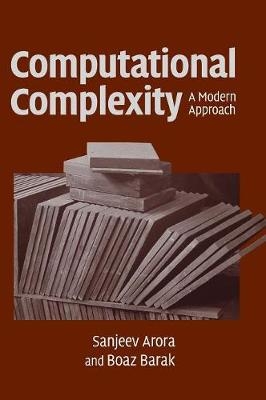
Computational Complexity
Cambridge University Press (Verlag)
978-0-521-42426-4 (ISBN)
This beginning graduate textbook describes both recent achievements and classical results of computational complexity theory. Requiring essentially no background apart from mathematical maturity, the book can be used as a reference for self-study for anyone interested in complexity, including physicists, mathematicians, and other scientists, as well as a textbook for a variety of courses and seminars. More than 300 exercises are included with a selected hint set. The book starts with a broad introduction to the field and progresses to advanced results. Contents include: definition of Turing machines and basic time and space complexity classes, probabilistic algorithms, interactive proofs, cryptography, quantum computation, lower bounds for concrete computational models (decision trees, communication complexity, constant depth, algebraic and monotone circuits, proof complexity), average-case complexity and hardness amplification, derandomization and pseudorandom constructions, and the PCP theorem.
Sanjeev Arora is a Professor in the department of computer science at Princeton University. He holds a Ph.D. from the University of California, Berkeley and has done foundational work in complexity theory, probabilistically checkable proofs, and approximation algorithms. Boaz Barak is an assistant professor in the department of computer science at Princeton University. He holds a Ph.D. from the Weizmann Institute of Science.
Part I. Basic Complexity Classes: 1. The computational model - and why it doesn't matter; 2. NP and NP completeness; 3. Diagonalization; 4. Space complexity; 5. The polynomial hierarchy and alternations; 6. Boolean circuits; 7. Randomized computation; 8. Interactive proofs; 9. Cryptography; 10. Quantum computation; 11. PCP theorem and hardness of approximation: an introduction; Part II. Lower Bounds for Concrete Computational Models: 12. Decision trees; 13. Communication complexity; 14. Circuit lower bounds; 15. Proof complexity; 16. Algebraic computation models; Part III. Advanced Topics: 17. Complexity of counting; 18. Average case complexity: Levin's theory; 19. Hardness amplification and error correcting codes; 20. Derandomization; 21. Pseudorandom constructions: expanders and extractors; 22. Proofs of PCP theorems and the Fourier transform technique; 23. Why are circuit lower bounds so difficult?; Appendix A: mathematical background.
| Erscheint lt. Verlag | 20.4.2009 |
|---|---|
| Zusatzinfo | Worked examples or Exercises; 6 Tables, unspecified; 1 Halftones, unspecified; 72 Line drawings, unspecified |
| Verlagsort | Cambridge |
| Sprache | englisch |
| Maße | 185 x 259 mm |
| Gewicht | 2780 g |
| Themenwelt | Informatik ► Theorie / Studium ► Kryptologie |
| Mathematik / Informatik ► Mathematik ► Allgemeines / Lexika | |
| ISBN-10 | 0-521-42426-7 / 0521424267 |
| ISBN-13 | 978-0-521-42426-4 / 9780521424264 |
| Zustand | Neuware |
| Informationen gemäß Produktsicherheitsverordnung (GPSR) | |
| Haben Sie eine Frage zum Produkt? |
aus dem Bereich


